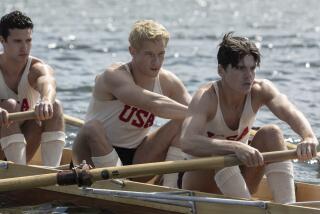Quiet Is the Rule Along the Channel : Marina del Rey Rowers Swift but Silent
- Share via
In years past, a number of Marina del Rey residents have complained of being wakened from early morning slumbers by the barked cadences and shouted orders of university rowing crews practicing in the main channel.
Meetings between the crews and county officials appear to have eliminated the unwanted wake-up calls, but on Wednesday the county Small Craft Harbor Commission approved updated rules regulating use of the marina by university crews.
The rules “are an agreement that has been in long standing with the rowing shell organizations that we have here,” said R. L. Dean, an administrator with the county Department of Beaches and Harbors. “All we really did was bring it up to date and reaffirm it with the colleges.”
The rules designate corridors for the racing shells and chase boats, ban the use of electronic bullhorns and require workouts before 7:30 a.m. on weekdays and 8:30 a.m. on weekends to be conducted in silence.
Men and women rowers from Loyola Marymount University and UCLA are often on the water at 6 a.m. each weekday.
Mike Bailey, head coach of the Loyola Marymount University men’s crew, said that most of the noise from his practices has been eliminated through the use of walkie-talkie headsets and speakers mounted in the eight-man racing shells.
He said he has not heard a single complaint about noise this season.
“The problems we’ve had in the past have been from coaches with megaphones screaming at their crews. I can do the same with this right here,” he said, pointing to his headset.
In addition, Bailey said that instead of relying on the coxswain to call or tap out the rhythm of their stroke, his crews keep time visually by imitating the rower in the “stroke seat,” closest to the stern of the shell.
Lee Miller, assistant coach for the UCLA men’s crew, said he does not use a megaphone either, but instead offers coaching tips after each run by pulling the chase boat alongside the shell and talking to his rowers.
“We try to keep the coaching done on a conversational level,” he said, adding that the team is considering buying a walkie-talkie system for coaches.
Dean said that coaches from both schools have done a good job of keeping the noise down.
“We haven’t really had any complaints since rowing shell crews, coaches and colleges became aware of the problems and became sensitive to them,” he said.
More to Read
Get our high school sports newsletter
Prep Rally is devoted to the SoCal high school sports experience, bringing you scores, stories and a behind-the-scenes look at what makes prep sports so popular.
You may occasionally receive promotional content from the Los Angeles Times.






